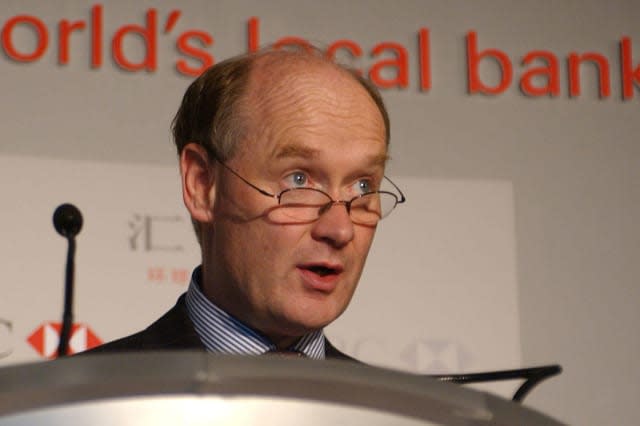'Capital flight risk' after a Yes

Uncertainty over currency in an independent Scotland could lead to "capital flight" from the country, according to the chairman of HSBC.
Douglas Flint warned that a Yes vote in next month's referendum could leave Scotland's financial system in a "parlous state".
Mr Flint, who describes himself as an exiled Scot, said the sterling currency union was an "anchor of financial stability" for Scotland.
Writing in a personal capacity in the Daily Telegraph, he said: "The alternatives to a currency union include a completely independent currency, passive acceptance of a monetary policy designed in London for the rest of the UK, or, assuming Scotland rejoins the European Union, eventual membership of the euro.
"In all these circumstances, the transition from the existing currency union would be complex and fraught with danger.
"At the extreme, uncertainty over the Scotland's currency arrangements could prompt capital flight from the country, leaving its financial system in a parlous state.
"This could, in turn, place enormous pressure on Scotland's future fiscal policies. Scotland would give up the benefits of being part of a larger fiscal union with the stability that offers in terms of scale, diversification and fiscal transfers."
Mr Flint said Scotland would face "an enormous challenge" to introduce its own currency, while an informal use of the pound, or "sterlingisation", would put "enormous pressure" on fiscal policy.
He said: "Monetary policy itself would be imported from the rest of the UK; Scotland would be faced with monetary policy implementation without representation - a very odd form of independence."
The three main parties at Westminster have all ruled out the Scottish Government's preferred option of a formal currency union between an independent Scotland and the rest of the UK.
Mr Flint said: "That decision is wholly consistent with the actions that have been taken in the aftermath of the financial crisis to minimise the risks to UK taxpayers from financial sector shocks arising in overseas and wholesale banking operations.
"It is also consistent with the knowledge gained from recent events in the eurozone, which have highlighted the challenges inherent in managing a currency union without political and fiscal union."
Speaking for the pro-Union Better Together campaign, Ian Murray, MP for Edinburgh South and shadow business minister said: "This is another hugely experienced expert who has underlined the currency chaos which has plagued Alex Salmond's campaign.
"When a voice such as Douglas Flint's warns of the risks of money leaving a separate Scotland to somewhere safer, you pay attention.
"With just days to go until up to a million Scots start voting by post, Alex Salmond is running out of time to name Plan B.
"Using the pound without any formal currency union would mean cuts to our public services, higher costs for Scottish families of things like credit card bills, car loans and mortgage costs. It would risk the livelihoods of millions of people in Scotland."
A spokesman for First Minister Alex Salmond said: "The governor of the Bank of England dealt with this issue just last week, when he made clear that contingency plans are in place - and following a Yes vote in the referendum, the Bank will continue to operate as a central bank during the 18-month transition process we have outlined.
"In any case, there is no denominational risk which would provoke capital flight because, as we have made clear, Scotland is keeping the pound and we are confident that will be in a formal currency union with the rest of the UK."


